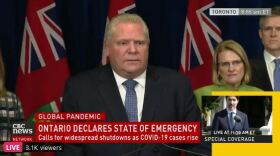Ontario's and Quebec's premiers are ordering non-essential businesses to close their workplaces by midnight Tuesday, provinces are contemplating closing their borders to each other, and Prime Minister Justin Trudeau has hinted that harsh measures might be used to keep people from gathering in groups.
Businesses that can continue operations with employees working remotely, or through other contingency measures, are being given approximately 36 hours to prepare and adapt. Essential services may continue their operations to maintain supply chains and ensure the people of Ontario have access to necessities, including groceries, medicines and other essential products.
"Based on the advice of Dr. Williams, Ontario's Chief Medical Officer of Health, and the experts at our Command Table, Ontario is taking further action to contain the spread of COVID-19," said Christine Elliott, Deputy Premier and Minister of Health. "These enhanced measures are necessary to protect the health and well-being of Ontarians. Nothing is more important."
Essential businesses include any for-profit or non-profit that provide food, alcohol, cannabis, safety and office products, gasoline and pharmaceuticals, among others. Teleworking, online and postal commerce are permitted for all businesses.
The Canadian government has rolled out a $30 million multi-media ad campaign to prevent COVID-19 cases. PM Trudeau said Canada is spending another $192 million on developing and producing vaccines for the novel coronavirus.
A Toronto doctor working on the front lines said it feels like the medical community is preparing for battle but doesn't know the enemy.
Dr. Seema Marwaha works as an internal medicine specialist at two hospitals in the greater Toronto area. She said nearly every aspect of her job has changed in the last month.
Doctors are screened before they enter the hospital, wards have significantly changed, and patients aren't treated one-on-one unless it is necessary. She said there is a lot of anxiety, because hospital staff know that they are putting themselves and their loved ones at an increased risk by working in health care.
Marwaha said it is also inspiring to see everyone stepping up, working hard and preparing to deal with whatever might lie ahead.
The latest numbers of confirmed and presumptive COVID-19 cases in Canada as of 4 a.m. Tuesday total 2,091 (36 presumptive, 2055 confirmed including 24 deaths, 15 resolved):
- Quebec: 628 confirmed (including 4 deaths, 1 resolved)
- Ontario: 503 confirmed (including 6 deaths, 8 resolved)
- British Columbia: 472 confirmed (including 13 deaths, 6 resolved)
- Alberta: 301 confirmed (including 1 death)
- Saskatchewan: 65 confirmed, 1 presumptive
- Nova Scotia: 41 confirmed
- Newfoundland and Labrador: 4 confirmed, 20 presumptive
- Manitoba: 14 confirmed, 6 presumptive
- New Brunswick: 8 confirmed, 9 presumptive
- Canadians quarantined at CFB Trenton: 13 confirmed
- Prince Edward Island: 3 confirmed
- The Territories: 3 confirmed







